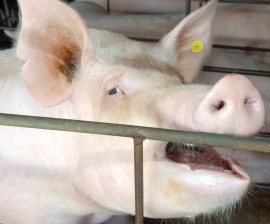-

Biting bars in frustration. Gerson Sobreira
Pigs are one of the smartest animals on Earth. Highly social, intelligent, and curious, they engage in complex tasks, form elaborate, cooperative social groups. Scientists have demonstrated that pigs are capable of playing simple video games, learning from each other, and even learning names. Undoubtedly, these animals feel fear, pain and stress.
Yet, most breeding pigs in Brazil are confined in “gestation crates” for virtually their entire lives, enduring a cycle of repeated impregnation. These individual cages are approximately 2 feet wide by 7 feet long—so small the animals can’t even turn around or take more than a step forward or backward.
Sows confined in crates are likely to experience boredom, frustration and psychological trauma. They also suffer from numerous health problems due to the confinement, such as urinary infections and lameness.
Viable alternatives exist
Alternative systems exist and are being used by many producers in Brazil and abroad. The most commonly used alternative to gestation crates is “group housing,” which allows animals to move around and socialize.
Iowa State University conducted a two-and-a-half year long economic comparison of gestation crates and group housing and found that “reproductive performance can be maintained or enhanced in well-managed group housing systems…without increasing labor.” Overall, the study concluded that “group housing…resulted in a weaned pig cost that was 11 percent less than the cost of a weaned pig from the individual stall confinement system.”
For more information on the economics of gestation crate alternatives, see HSI’s report [PDF]
The world moves away from gestation crates
Gestation crate confinement has come under fire from veterinarians, farmers, animal welfare advocates, animal scientists, consumers and others. Renowned animal welfare scientist Dr. Temple Grandin says, “We’ve got to treat animals right, and gestation stalls have got to go.” She continues, “Confining an animal for most of its life in a box in which it is not able to turn around does not provide a decent life.”
The continuous confinement of breeding sows has already been banned throughout the European Union, Canada and nine US states. It will also be phased-out in New Zealand by 2015 and Australia by 2017. The South Africa Pork Producers Organization expects to phase out the continual confinement of sows in gestation crates by 2020.
Leading multinational food retailers are also adopting crate-free purchasing policies. McDonald’s, Burger King, Subway and around 60 other leading food companies are implementing crate-free policies for their supply chains in the United States.
The movement is also gaining momentum in Brazil. Arcos Dorados, McDonald’s largest operator in Latin America and the Caribbean, announced that all its pork suppliers will have to present documented plans to limit the use of gestation crates and adopt group housing systems.
Major pork producers are also moving away from this practice. Smithfield Foods, the largest pork producer in the world, will be gestation crate-free in its whole supply chain by 2022. Olymel, the largest pork producer in Canada, also announced it will be crate-free by 2022. Pork producer Cargill is already 50 percent gestation crate-free in its operations.
You can help
- Learn more about gestation crates
- Watch a video about intensive confinement
- Read our report about the environmental impacts of industrialized animal agriculture
- Eat more humanely
- Join us! Sign up to receive the latest news and action alerts
- Join our global community on Facebook
- Back to HSI in Brazil’s main page
